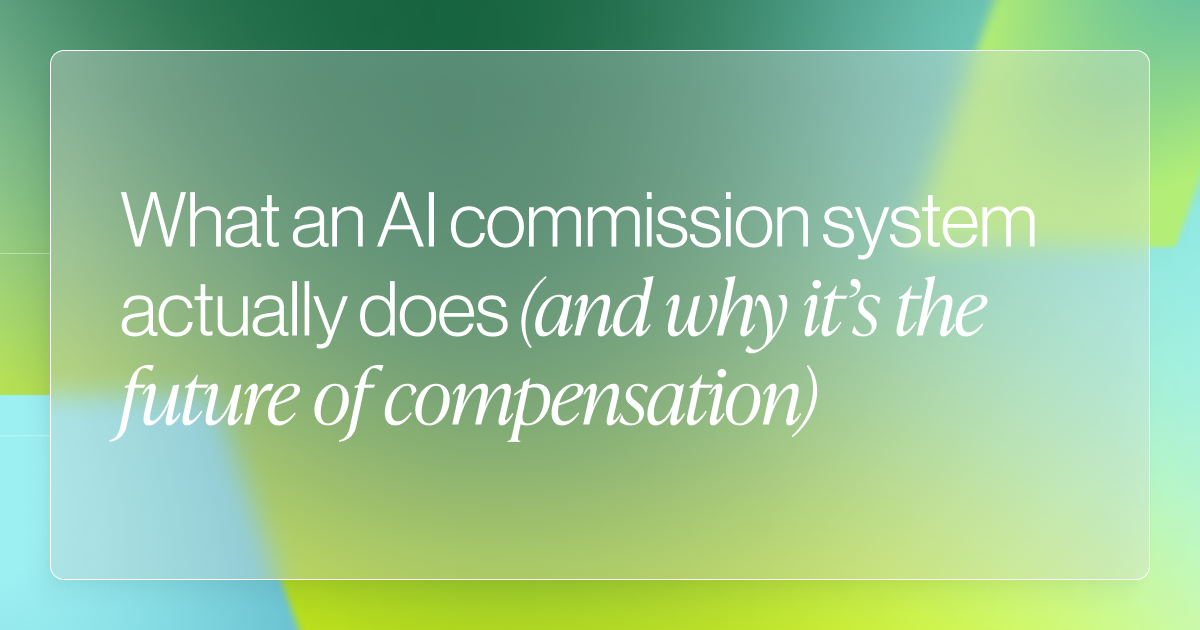Best Sales Commission Software: 2025 Buyer's Guide & Vendor Comparison
Two-thirds of companies admitted to overpaying or underpaying commissions in the past year, according to our 2025 State of Incentive Compensation Management report. Even minor errors in payouts can be costly to your business. Your reps lose trust in you, commissions disputes drain time and resources, and your revenue forecasts are skewed. These errors can even expose your business to compliance risks, since commission payments are legally treated as wages under labor laws.
These errors are far more likely when companies rely on spreadsheets or outdated legacy tools to track and calculate commissions. We found that only 27% of organizations have fully automated their commission management systems, while 30% aren’t using any incentive compensation management (ICM) tools at all. Without automation, teams waste an average of 89 hours each month on manual tasks. That’s time that could be spent nurturing high-value prospects, coaching reps, or refining your sales strategy.
On the other hand, companies that adopted sales commission software have reduced their payout friction, scaled efficiently, and improved overall commission payout accuracy. In fact, 43% of companies report better accuracy after implementing newer tech, even though only 27% have fully automated their commissions processes which shows there’s still major upside in modernizing.
In this guide, we’ll show you some of the best sales commission software available now. Plus, we’ll share what features to look for when trying to optimize your sales compensation workflows so you can streamline payouts, reduce errors, and give your sales team full confidence in their earnings.
What is Sales Commission Software?
Sales commission software automates the calculation, tracking, and reporting of sales commissions so reps are paid accurately and on time. Companies can use these tools instead of manual processes or legacy tools to improve accuracy, save time, and increase transparency on how their commission structures work.
They’re also built for scalability. Most sales commission software platforms can handle increasing transaction volumes, multiple sales teams, complex commission rules, and integrations with tools like CRM or ERP systems without slowing down. As your company adds new products, territories, or reps, the software can adjust calculations and reporting automatically. So you don’t have to rebuild processes every time you grow.
What Features Should You Evaluate?
As your company grows, enters new markets, or launches new products, you’ll need to adjust how you reward your sales team. A software platform with flexible commission plan design makes those changes painless instead of a months-long rebuild.
Commission Plan Design and Flexibility
Your commission strategy will evolve as your business, team size, and sales goals change — you want your software to keep up. Look for a tool that lets you create and adjust different plan types without rebuilding everything from scratch.
This includes:
- Creating and modifying different plan types (e.g., flat-rate, tiered, split, or hybrid) without starting over
- Testing new commission models when business goals or market conditions shift
- Rolling out mid-year adjustments (like new accelerators or SPIFFS) without disrupting payouts
Calculation Engine and Accuracy
The calculation engine is the “brain” of your software. It processes all of your sales data, commission rules, and exceptions to produce accurate payouts. Needless to say, you’ll want a tool with razor-sharp accuracy. That’s where automation comes in.
As the company grows, your tool will deal with dozens, if not hundreds, of reps, thousands of transactions, and multiple commission rules. Manually checking and processing all of this is impossible.
When analyzing any potential tools, look for:
- Robust rule handling. The software can handle multiple types of rates and custom exceptions without breaking.
- Real-time or near real-time calculations. Reps can track their earnings, and managers can forecast payouts.
- Audit trails. Built-in logs showing how each payout was calculated. This is crucial for resolving disputes or compliance audits.
- Scalability. The engine should maintain accuracy and speed even as your team and transaction volume grow.
Integration Capabilities
Your sales commission software doesn’t exist in a “tech vacuum.” Make sure it connects to your CRM (like Salesforce or HubSpot) to pull deal data like amounts, close dates, and rep crediting. This ensures commissions are calculated on real, up-to-date bookings.
It should also sync with your ERP or finance system (such as NetSuite or SAP) to reconcile booked vs. billed revenue, handle multi-currency conversions, and manage clawbacks or refunds. And it should integrate with your HRIS (e.g., Workday or BambooHR) to ensure each rep is tied to the right plan, territory, and eligibility after promotions or transfers. Finally, your chosen tool needs to feed approved payouts into payroll so commissions land in regular pay runs without manual uploads.
Integration with these tools eliminates duplicate data entry, reduces payout errors, and gives every stakeholder from RevOps to Finance and HR a single source of truth for commission calculations. When scanning the market, look for tools that offer native integrations with your existing tools, robust APIs, and pre-built connectors like NetSuite or Workday.
Reporting and Analytics
Your tools collect data. Your CRM collects data like booked deals and revenue, and your ERP collects data on finalized invoices and payments. It’s a missed opportunity to let all of this commission data go to waste.
Commission software pulls data automatically from these sources to calculate payouts. But it doesn’t have to stop there. Your software should turn your commission data into real-time insights you can act on. Through reporting and analytics features, you can spot trends in sales performance, forecast commission expenses, and identify gaps in your incentive strategy before they become costly problems.
Look for tools that:
- Offer customizable dashboards for both managers and salespeople
- Provide drill-down reports by rep, team, product line, or time period
- Support exportable data or integrations for deeper analysis in BI tools
- Include forecasting features to model commission expenses against revenue goals
User Experience and Adoption
You can buy the most powerful commission management software on the market, but you’re wasting your money if your team struggles to use it. Select a tool that’s easy to use and has an intuitive interface that both admins and sales reps can navigate. Clean dashboards, clear labels, and simple workflows prevent frustration and user errors.
Look for no-code configuration options so RevOps or finance managers can update commission rules, dashboards, or payout structures without relying on engineering support. A smooth, self-service experience with guided onboarding means you spend less time and money on training new users. Your sales teams should know where to check their progress, projected payouts, and performance metrics without extra hand-holding.
Top 10 Sales Commission Software Vendors
We’ve rounded up 10 of the best sales commission software solutions for 2025 to help you in your search. Below you’ll find an at-a-glance look at each vendor’s strengths, key features, and ideal use cases so you can quickly narrow down which tools fit your team’s needs.
CaptivateIQ — Best Overall Platform
CaptivateIQ is a modern incentive compensation management (ICM) and sales commission software tool built for organizations moving beyond spreadsheets and rigid legacy systems. It unifies territory, quota, and compensation planning in one platform so RevOps, Finance, and Sales all operate from the same source of truth. It allows modeling of complex plans, real-time performance tracking, and flexible plan adjustments via no-code tools.
Key Features
- SmartGrid™ and no-code plan builder offer flexible plan design
- Automated commission calculations provide real-time visibility
- Integrates with major CRMs, ERPs, HRIS, and payroll tools
- Robust reporting, analytics, and what-if scenario modeling
Pros & Cons
Based on reviews
Ratings
G2: 4.7/5
Capterra: 4.8/5
Best For
Mid-market and enterprise companies that need scalable, flexible commission management with transparent, real-time visibility.
Everstage — Strong Mid-Market Option
Everstage is a commission and incentive compensation platform built for teams that want flexibility and transparency. It specializes in giving reps real-time insights into their earnings while helping admins design, test, and deploy incentive plans without heavy engineering support.
Key Features
- Real-time commission tracking and live dashboards for reps and managers
- Plan design tools that support complex rules, quotas, and capacity and territory planning
- Integration across CRM, multi-currency support, audit trails, and compliance features
- Detailed earnings statements and visibility into performance metrics and forecasts
Pros & Cons
Ratings
G2: 4.9/5
Capterra: 4.8/5
Best For
Teams that need transparent commission visibility and flexible incentive plan design but want to avoid setup getting bogged down, especially growing mid-market or rapidly scaling sales orgs.
Xactly Incent — Enterprise Legacy Solution
Xactly Incent is one of the most established sales commission software platforms, trusted by large enterprises for over a decade. It automates highly complex commission rules, supports compliance-heavy industries, and integrates deeply with enterprise CRMs and ERPs. Its robust feature set is ideal for global companies needing scale and audit-ready accuracy.
Key Features
- Handles complex, multi-tier commission rules and global compensation structures
- Deep CRM, ERP, and HRIS integrations with strong audit and compliance tools
- Advanced analytics and forecasting capabilities for enterprise-scale operations
- Secure, enterprise-grade performance and uptime for large organizations
Pros & Cons
Ratings
G2: 4.3/5
Capterra: 4.2/5
Best For
Enterprises or global organizations with complex, regulated compensation structures that need a long-standing, feature-rich solution to handle scale and compliance.
Performio — Flexible Data Handling
Performio is a commission management platform known for handling complex compensation structures and diverse data sources. It’s especially valued by companies that need to manage intricate commission logic without relying heavily on engineering support. Performio offers strong reporting tools and flexible integrations that make it a fit for organizations transitioning from spreadsheets or rigid legacy systems.
Key Features
- Handles complex commission logic and data transformations
- Supports multiple currencies and custom rules for global teams
- Detailed dashboards for reps and managers to track performance and payouts
- Integrates with major CRMs, ERPs, and payroll systems for seamless data flow
Pros & Cons
Ratings
G2: 4.4/5
Capterra: 4.3/5
Best For
Organizations with complex commission logic and diverse data sources that need a robust, flexible system to replace spreadsheets or legacy solutions.
SAP SuccessFactors Incentive Management (Formerly SAP Commissions) — Enterprise Integration
SAP SuccessFactors Incentive Management is an enterprise-grade sales commission and incentive compensation management (ICM) solution. It’s designed for large organizations with complex global operations, multiple product lines, and intricate commission structures. SAP’s platform emphasizes deep integration with enterprise systems, strong compliance controls, and scalability for high-volume transactions.
Key Features
- Enterprise-level calculation engine capable of handling high transaction volumes
- Tight integration with SAP ERP, SuccessFactors HCM, and CRM systems
- Advanced audit trails, compliance features, and robust security
- Flexible plan design tools for complex, multi-currency commission structures
Pros & Cons
Ratings
G2: 4.2/5
Capterra: 4.6/5
Best For
Large enterprises already using SAP systems that need a robust, deeply integrated solution for managing complex, global commission programs.
Varicent — Comprehensive ICM Suite
Varicent is a mature, enterprise-grade incentive compensation management (ICM) platform designed for organizations with highly complex, global compensation needs like multi-currency payouts, multiple sales hierarchies across regions, intricate quota structures, and strict compliance or audit requirements. It offers advanced analytics, forecasting, and planning capabilities alongside its robust commission calculation engine.
Key Features
- Advanced territory, quota, and incentive compensation planning tools
- Powerful calculation engine for complex, multi-currency, multi-region commission rules
- Extensive reporting and analytics with customizable dashboards
- Strong governance, compliance controls, and audit trails
Pros & Cons
Ratings
G2: 4.5/5
Capterra: 5/5 (note: only 6 reviews)
Best For
Enterprises that need one platform to manage complex, multi-region compensation plans, advanced forecasting, and deep analytics under strict governance requirements.
Spiff — Native Salesforce Integration
Spiff is a modern, user-friendly commission software built to automate complex commission calculations and provide reps with clear, real-time visibility into their earnings. It’s known for its tight integration with Salesforce but also connects with other CRMs and financial tools, making it a flexible choice for sales organizations that want speed and transparency.
Key Features
- Native Salesforce integration with support for other major CRMs
- Real-time commission tracking and automated calculations
- Customizable dashboards and earnings statements for reps and managers
- Audit trails and compliance features to reduce disputes and errors
Pros & Cons
Ratings
G2: 4.7/5
Capterra: 4.7/5
Best For
Sales teams who are already invested in Salesforce or looking for fast, transparent commission automation without the heavy lift of a large enterprise platform.
Anaplan — Planning-Focused Platform
Anaplan is a powerful connected-planning platform with capabilities that extend beyond commission management. While not a dedicated commission-only tool, its flexible modeling and enterprise-grade analytics make it a strong choice for organizations that want to align commission planning with broader business strategy, financial forecasting, and resource allocation.
Key Features
- Connected planning across sales, finance, and operations teams
- Flexible modeling for commissions, quotas, and territories
- Advanced forecasting and scenario planning for complex organizations
- Robust analytics and reporting for enterprise-scale visibility
Pros & Cons
Ratings
G2: 4.6/5
Capterra: 4.3/5
Best For
Enterprises that need a planning-focused platform to integrate commission management with financial forecasting, strategic planning, and company-wide performance management.
Commissionly — SMB Solution
Commissionly is a commission-management platform built for small to mid-sized sales teams — generally fewer than about 50 reps. It focuses on simplicity, flexible commission rules, and easy-to-understand reporting without requiring heavy technical resources.
Key Features
- Supports splits, territory rules, overrides, and multiple commission structures
- Customizable report builder and dashboards with scheduled reporting
- Imports data from external sources (email or data hub) to feed calculations
- Cloud-based setup wizard for flat, tiered, product-, or profit-based commissions
Pros & Cons
Ratings
G2: not listed
Capterra: 4.9/5
Best For
Startups and SMBs seeking a lightweight commission solution that’s easy to implement, transparent, and requires minimal ongoing management.
Qobra — European-Focused Platform
Qobra is a commission and incentive compensation tool designed with international teams in mind. It’s a popular option for businesses operating in Europe or multiple regions, with support for local regulations, diverse compensation structures, and in-depth visibility for reps and managers.
Key Features
- Multi-currency and multi-region support with compliance for local commission/reporting standards
- Real-time dashboards so reps can track earnings and quota attainment continuously
- Flexible plan design (splits, accelerators, bonuses, custom rules)
- Integrations with major CRMs and export-friendly reports for finance and admin
Pros & Cons
Ratings
G2: 4.8/5
Capterra: 4.9/5
Best For
Companies operating across European or international markets that need localized commission support, multi-region compensation flexibility, and clear visibility for both reps and leadership.
Comparison Table
Here’s a side-by-side look at the top sales commission software vendors so you can quickly evaluate ratings, standout features, and fit with your business needs. Use this table to streamline your tool selection process.
Why CaptivateIQ Leads the Market
CaptivateIQ consistently earns top ratings because it solves the biggest commission-management pain points for revenue operations and sales leaders. Here’s why it stands out from other sales commission software:
- Accuracy and trust. Reliable commission calculations reduce the number of disputes you need to deal with and build confidence with sales reps.
- Scalability. Your commission system needs to handle growing teams, new markets, and increasingly complex sales compensation plans without forcing you to re-platform or slow down operations.
- Transparency and visibility. Dashboards, clear commission tracking, and notifications let sales reps know where they stand.
- Flexibility and adaptability. Because business goals shift, CaptivateIQ’s flexibility (handling complex comp-structures, faster plan changes) is repeatedly called out. Users appreciate that the platform can evolve as needs change.
Here’s how CaptivateIQ users describe the difference it’s made:
“CaptivateIQ allows me to have reliable and accurate commission calculations. I decreased the amount of time I spent on calculations themselves and it gives me confidence in the accuracy of the results.” - Jeff M., Head of Strategic Finance at Harness
“I love CaptivateIQ. I have been very impressed with the product road map and enhancements. We can make changes ourselves with ease. Our small but mighty team also has been able to cut down significantly on compensation errors.” - Michael Duncan, Director of Revenue Operations at Gong
Discover why leading revenue teams trust CaptivateIQ and sign up for a demo now.
Sales Commission Software FAQs
How much does commission software cost?
Pricing for sales commission software varies widely based on your business needs, company size, and feature set. Most vendors offer tiered SaaS pricing starting around $20–$40 per user/month for small teams and climbing into enterprise-level contracts for large organizations with complex sales compensation plans. Expect additional costs for implementation, premium integrations, or advanced reporting features. Always request a customized quote and compare vendors to find the best fit.
How long does implementation take?
Implementation can range from a few weeks to several months, depending on your existing processes and the complexity of your sales incentive structures. Simple setups for smaller teams might take 4-6 weeks, while enterprise-level rollouts involving territory alignment, quota planning, and end-to-end integrations can take 3-6 months. Choose a vendor with strong onboarding support and clear templates to streamline the process and reduce delays.
What integrations are most important?
At a minimum, connect your commission software to your CRM (e.g., Salesforce) for deal data and your payroll or ERP system for payouts. HRIS tools keep employee compensation data synced, while analytics platforms turn commission data into insights about team performance. Reliable integrations across your revenue operations stack reduce manual work, prevent errors, and ensure accurate, real-time visibility into commissions.
How do you measure ROI from commission software?
Track metrics like time saved on manual calculations, accuracy of payouts, reduction in payment disputes, and improvements in sales representatives’ motivation or team performance. Look at how quickly you can adjust sales compensation plans to match changing business needs and whether automation has reduced administrative costs.
.svg)


.png)





